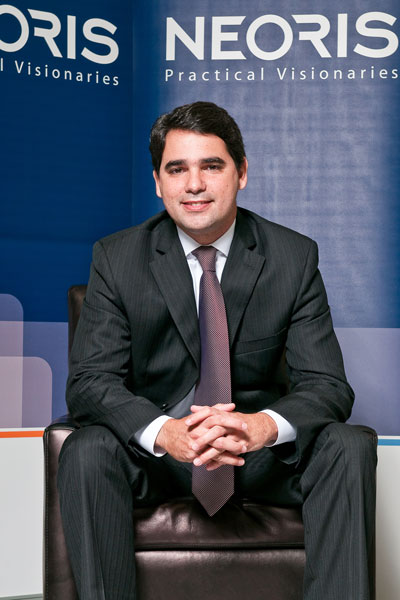NEORIS chief marketing officer Marcelo Costa joined the company shortly after its inception, bringing his expertise from both personal banking and IT industries. Costa’s leadership ushered NEORIS and its customers into the age of digital business. He sits down with HE to discuss the company’s impressive growth and how he has immersed the marketing department into the customer experience.
NEORIS has been experiencing compounded annual growth of 20 percent since 2006. How did your banking and technology background prepare you to help support that kind of ongoing success?
My background as an analyst at BankBoston and a marketing manager at Unibanco taught me how to navigate a large, corporate environment, while working in sales and marketing at MLab (an online performance analytics company, formerly Medialab) taught me to be creative and entrepreneurial. So, the skills I acquired prior to joining NEORIS have been important for working in the consulting environment. But the most important factor is simply knowing that you can’t succeed in marketing without paying full attention to the customer’s needs. That’s the case no matter the industry or size of the company.

You took on the role of CMO in 2009 after almost a decade with the company. Have there been significant changes in the challenges you face in the leadership role?
The biggest challenge has been adapting to the rapidly changing of pace in the professional services industry. I need to be ready to get involved in many activities that go beyond the scope of traditional marketing, such as analyst relations, working very closely with sales, understanding finance, human resources, and helping develop go-to-market plans with partners like SAP and Microsoft. All of that requires an understanding of how every task fits into the big picture, so I see myself not just as a marketer, but as a partner who’s very closely aligned with the business side of the company.
How do you keep track of so many different details and shifting priorities?
I make sure that my team listens to the sales team since they interact with customers on a daily basis. Everyone on my team spends times going on sales calls, visiting clients, and scheduling meetings with our partners. Just being in the office focusing on strategy isn’t enough. I have to be on the front lines in order to understand the issues, viable solutions, what our business people are facing, and what our customers want.
For a tech company operating globally, you have a very hands-on, face-to-face approach. Why?
Because it’s important to make sure that the resulting solutions are appropriate for each culture. That’s also the challenging part. You can never underestimate the differences that come about due to each local business environment. But our focus on the human factor makes all the difference in developing the right approach.
What is your strategy for guiding how the marketing department contributes to company growth?
We measure, measure, and measure again. We are constantly collecting and analyzing data. For every marketing dollar we spend, there has to be a plan with clear objectives and outcomes to compare. That has become easier with digital marketing, which we devote a lot of attention to. The specific [key performance indicators] for each initiative are different, like the number of leads that are converted or clicks on an online post, but they are all clear indicators of customer-focused investments and long-term value for the business.
As a result, we’ve already seen double-digit growth in several digital channels: YouTube for supporting sales and recruitment; Twitter for reaching clients, analysts, and the media; and our LinkedIn page now gets as many views each month as our web site. We’ve also put more focus on content marketing from our top leadership to showcase our experience and industry expertise, not just our technology and services. It’s another way to provide value as we track who’s interested in our solutions, what their specific concerns are, and how we can directly address their priorities.
Do you have any predictions for where the consulting industry will be heading in the next two years?
Every industry, not just ours, is going to be challenged by the digital transformation that’s changing companies and how they do business. That’s for everyone, including brick-and-mortar facilities and organizations that would seem to have had nothing to do with technology a few years ago. It’s the way Uber and Airbnb have changed transportation and lodging. So, as a consulting company, we may not be able to predict every single move of the market, but I know we’ll constantly be tracking the impact that evolution has on our customers and what we need to do to address the new challenges they face.

